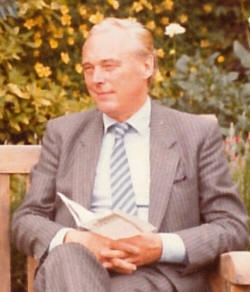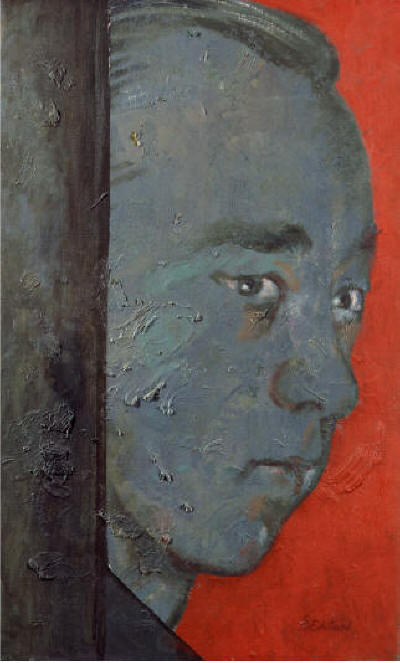

Queer Places:
807 Hood House, Dolphin Square, Pimlico, London SW1V 3LX
 William John Christopher Vassall (20 September 1924 – 18 November 1996) was a British civil servant who spied for the Soviet Union, allegedly under pressure of blackmail, from 1954 until his arrest in 1962. Although operating only at a junior level, he was able to provide details of naval technology which were crucial to the modernising of the Soviet Navy. He was sentenced to eighteen years' imprisonment, and was released in 1972, after having served ten. The Vassall scandal greatly embarrassed the Macmillan government, but was soon eclipsed by the more dramatic Profumo affair.
The item on ‘Homosexuality’ in Norman Polmar and Thomas B. Allen’s generally
reliable Encyclopedia of Espionage (1998) names just nine homosexual men and
one bisexual: Alfred Redl,
Guy Burgess, the bisexual
Donald Maclean,
Anthony Blunt,
Alan Turing, James A.
Mintkenbaugh, William Martin,
Bernon Mitchell,
John Vassall and
Maurice Oldfield. The
last-named had to resign his position as co-ordinator of UK security and
intelligence in Northern Ireland after he was found to be homosexual; there
was no suggestion that in his previous incarnation as Director General of MI6
he ever spied for anyone but his own Whitehall masters.
William John Christopher Vassall (20 September 1924 – 18 November 1996) was a British civil servant who spied for the Soviet Union, allegedly under pressure of blackmail, from 1954 until his arrest in 1962. Although operating only at a junior level, he was able to provide details of naval technology which were crucial to the modernising of the Soviet Navy. He was sentenced to eighteen years' imprisonment, and was released in 1972, after having served ten. The Vassall scandal greatly embarrassed the Macmillan government, but was soon eclipsed by the more dramatic Profumo affair.
The item on ‘Homosexuality’ in Norman Polmar and Thomas B. Allen’s generally
reliable Encyclopedia of Espionage (1998) names just nine homosexual men and
one bisexual: Alfred Redl,
Guy Burgess, the bisexual
Donald Maclean,
Anthony Blunt,
Alan Turing, James A.
Mintkenbaugh, William Martin,
Bernon Mitchell,
John Vassall and
Maurice Oldfield. The
last-named had to resign his position as co-ordinator of UK security and
intelligence in Northern Ireland after he was found to be homosexual; there
was no suggestion that in his previous incarnation as Director General of MI6
he ever spied for anyone but his own Whitehall masters.
Born in 1924 and known throughout his life as John Vassall, he was the son of William Vassall, chaplain at St Bartholomew's Hospital, London, and Mabel Andrea Sellicks, a nurse at the same hospital.[1] He was educated at Monmouth School. During the Second World War he worked as a photographer for the Royal Air Force. After the war, in 1948, he became a clerk (clerical officer) at the Admiralty. Although his father was an Anglican priest, his mother converted to Roman Catholicism, a decision that led to tensions within their marriage. Vassall himself converted to Catholicism in 1953.[2]
In 1952, Vassall was appointed, still as a clerical officer, to the staff of the Naval Attaché at the British embassy in Moscow. There, he said later, he found himself socially isolated by the snobberies and class hierarchies of diplomatic life, his loneliness further exacerbated by his homosexuality, which was still illegal in both Britain and the Soviet Union at the time.[3] He became acquainted with a Pole named Mikhailsky, who worked for the Embassy, and who introduced him to the homosexual underworld of Moscow. In 1954, he was invited to a party, where he was encouraged to become extremely drunk, and where he was photographed in compromising positions with several men.[4][5] The party, arranged by the KGB, had been a classic "honeytrap". The Soviets used the photographs to blackmail Vassall into working for them as a spy, initially in the Moscow embassy, and later in London, following his return there in June 1956. He returned to the Admiralty, where he worked first in the Naval Intelligence Division, and then, as the clerical officer assistant to the Private Secretary, in the Private Office of Tam Galbraith, a Conservative Party politician and Civil Lord of the Admiralty. At the time of his arrest he was working in Military Branch II.

William John Christopher Vassall
by Cecil Beaton
oil on canvas, 1966
22 in. x 13 7/8 in. (557 mm x 352 mm)
Given by the Trustees of the estate of Eileen Hose, 1991
Primary Collection
NPG 6552
Vassall was identified as a potential spy after Anatoliy Golitsyn, a senior member of the KGB, defected to the United States in 1961. The KGB, worried that Vassall would be exposed, ordered him to cease operations until further notice. Another defector, Yuri Nosenko, added to the case against Vassall, but doubts about the evidence provided by both Golitsyn and Nosenko persisted. Documents and microdots provided by the 1960 Polish defector Michal Goleniewski may also have contributed to the case against him.[9][10] Vassall soon resumed his work. It had become obvious to his colleagues that Vassall had some other source of income, for he moved to an expensive flat in Dolphin Square, took foreign holidays, and was said to own 36 Savile Row suits.[11] His annual expenditure was later estimated at about £3,000, when his official salary was £750;[12] but he explained that he had an inheritance from a distant relative. On 12 September 1962, Vassall was arrested and charged with spying. He made a full confession, and directed detectives to the cameras and films concealed in his flat.[13] The documents that he admitted to stealing did not account for everything believed to have been taken, however, which led to speculation that there was another spy still operating in the Admiralty. Some have suggested that Vassall was deliberately sacrificed by the KGB in an attempt to protect the other (possibly more senior) spy. In October, Vassall was sentenced to 18 years in jail. While in Wormwood Scrubs prison, Vassall became acquainted with neo-Nazi Colin Jordan who later wrote to Prime Minister Harold Macmillan claiming that, courtesy of Vassall, he had evidence of 'a network of homosexual politicians'. The Security Service MI5 interviewed both Vassall and Jordan and dismissed the homophobic claims.[14][15]
Vassall served ten years of his sentence, in Wormwood Scrubs, Maidstone and Durham prisons.[16] Many considered him to have been a relatively innocent victim of circumstances, and he was befriended in prison by social reformer Lord Longford. He was eventually released on parole in October 1972. He then wrote a memoir, published in 1975 as Vassall: the autobiography of a spy. He described it as "a kind of self-justification, not as regards my espionage activities, but as regards my position as a human being, and, perhaps, my ability to make and keep friends in all walks of life".[17] Rex Winsbury called the book "[a] cross between Jennifer's Diary [the society column of Queen magazine] and James Bond, ... bewildering both for Vassall's own transparent naivety and social snobbism, ... and for the equally transparent naivety of the British Foreign Office and security forces".[18] Hungarian émigré George Mikes similarly concluded that it was Vassall's "vanity, his childish snobbery, his devouring ambition and complete lack of humour that pushed him so deep into the quagmire".[19] Vassall subsequently changed his surname to Phillips, settled in St John's Wood, London, and worked quietly as an administrator at the British Records Association, and for a firm of solicitors in Gray's Inn.[1][11] He died after suffering a heart attack on a London bus in November 1996: it was not until nearly three weeks later that the press became aware of his death.[1]
My published books: